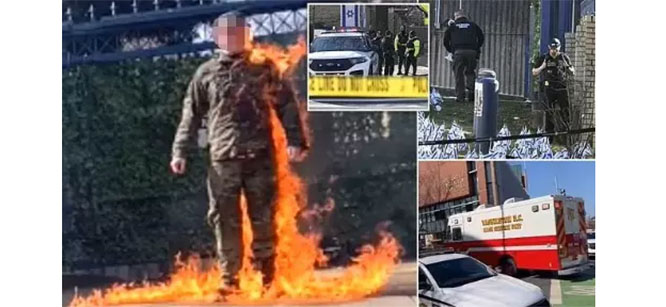
An active member of the United States military has set himself on fire outside the Israeli embassy in Washington, DC, according to officials, in an apparent act of protest against Israel’s devastating war on Gaza.
The man, whose name was not immediately released, was rushed to the hospital on Sunday with “critical life-threatening injuries”, according to the US capital’s fire department.
The agency said emergency responders rushed to the scene just before 1pm (18:00 GMT) in response to a “call for person on fire outside the Israeli embassy”.
They arrived to find that officers from the US Secret Service had already extinguished the fire.
The US Air Force said that the incident involved an active duty airman.
US media reported that the man livestreamed himself on Twitch, wearing fatigues and declaring he would “not be complicit in genocide” before dousing himself in liquid.
He then lit himself on fire while yelling “Free Palestine!” until he fell to the ground.
The footage has since been removed from Twitch. Local police said they are investigating the incident.
The police also said an explosive ordinance disposal was requested to the scene in relation to a suspicious vehicle that may be connected to the individual. It later said that no hazardous material was found.
The Israeli embassy said that none of its staff members were injured, and all personnel have been confirmed to be safe, a spokesperson told the New York Times.
Israel’s embassy has been the target of continued protest against the Israeli war on Gaza. The protests started after October 7 when Hamas, the Palestinian group that rules Gaza, responded to Israeli barbarism though violent attack.
Since then, Israeli forces have waged a brutal military campaign against the coastal enclave, laying much of it to waste, with nearly 30,000 people dead, according to Palestinian health officials.
In December, a protester set herself on fire outside the Israeli Consulate in Atlanta. A Palestinian flag was found at the scene, and the act was believed to be one of “extreme political protest”.






Comments
Add new comment